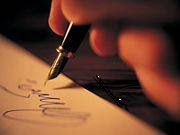
Artists, writers, poets, and musicians are faced with the issue of protecting their products from theft. They are forced to register their products under a legal process which is called "Intellectual Property Law." It is not an easy process, and it is not foolproof.
It's hard for such artists to make a living at their trade. People are skeptical of the originality of their concepts, and frequently are ready to challenge them in order to make money. Intellectual Property Law, therefore, is a necessity...and like any other form of litigation, it is more properly applied in advance rather than after a challenge. An artist registers his or her product with an appropriate agency, verifying the date of its creation and a basic description of its application.
Yesterday, for instance, I wanted to use a panoramic view of the New York City skyline by photographer Andrew Prokos. His written information indicated that the use of his photos was available, but only after getting written permission from him. He says in his website that it may take up to 24 hours to receive that note from him.
Consequently, I went with a more inferior product, but wrote to him anyway, asking for permission to use his panorama. I received a very nice, personal note from him granting me permission, and instructing me in how to use a credit statement that would direct people to his website. Clearly, he is a professional photographer, and his goal is to sell photos. So, here is that panorama at the top of this posting, and you will find his photo credit below. I felt like I had gained a new friend in the process.
People abuse the copyright laws all the time. Sometimes it is unintentional, but most of the time, it is a bias on the part of the public that an artistic product, especially a piece of music, is not the same thing as a patented design for a new hammer or an HD television screen. They are wrong. Artists work hard to provide a product,whether it be a piece of music, a painted or photographed piece, or a written piece. They deserve to be compensated for that work. Music pirating is rampant, and the person who is harmed by it is the musician who created the original piece.New intellectual property laws are more stringent, and the courts are taking them seriously.
Recently in Providence, the owner of an Irish bar was fined heavily for hiring musicians to perform in his bar who played music for which they had no composer permission. It shocked the public, enraging those who were ignorant about intellectual property law, but it was proper, and stood to make a point. Perhaps it was the first time some people saw the application of the law "up front and personal."
Litigation should not be the prominent feature of commerce that it is in the United States. I think it should be a matter of last resort, when everything else fails. But many times, in the case of intellectual property theft it is the only way to get the attention of the public. Artists of all shapes and hues have to be better business people if they are to survive economically.
Photo Credit: NYC Photography by Andrew Prokos
Definition Credit: Dictionary.com Unabridged
Based on the Random House Dictionary, © Random House, Inc. 2009.

good point, critical topic, and it's very cool how you're adapting your focus to fit your "holiday" in "the big apple" ... "superlative" in SO many ways, skyline among them. we're headed to miami tomorrow ... yet another skyline ...
ReplyDelete